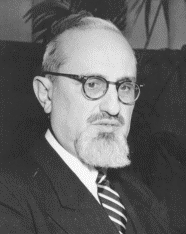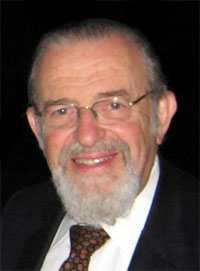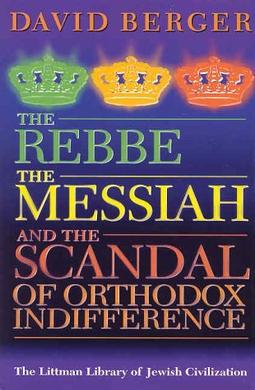Related Research Articles

Mordecai Menahem Kaplan, was a Lithuanian-born American rabbi, writer, Jewish educator, professor, theologian, philosopher, activist, and religious leader who founded the Reconstructionist branch of Judaism along with his son-in-law Ira Eisenstein. He has been described as a "towering figure" in the recent history of Judaism for his influential work in adapting it to modern society, contending that Judaism should be a unifying and creative force by stressing the cultural and historical character of the religion as well as theological doctrine.

Orthodox Judaism is the collective term for the traditionalist and theologically conservative branches of contemporary Judaism. Theologically, it is chiefly defined by regarding the Torah, both Written and Oral, as revealed by God to Moses on Mount Sinai and faithfully transmitted ever since.
The relationships between the various denominations of American Judaism can be conciliatory, welcoming, or even antagonistic.
Modern Orthodox Judaism is a movement within Orthodox Judaism that attempts to synthesize Jewish values and the observance of Jewish law with the secular, modern world.

Joseph Ber Soloveitchik was a major American Orthodox rabbi, Talmudist, and modern Jewish philosopher. He was a scion of the Lithuanian Jewish Soloveitchik rabbinic dynasty.

Norman Lamm was an American Modern Orthodox rabbi, scholar, academic administrator, author, and Jewish community leader. He was the Chancellor of Yeshiva University until he announced his retirement on July 1, 2013.
Torah Umadda is a worldview in Orthodox Judaism concerning the relationship between the secular world and Judaism, and in particular between secular knowledge and Jewish religious knowledge. The resultant mode of Orthodox Judaism is referred to as Centrist Orthodoxy.
The National Council of Young Israel (NCYI) or Young Israel, is a synagogue-based Orthodox Judaism organization in the United States with a network of affiliated "Young Israel" synagogues. Young Israel was founded in 1912, in its earliest form, by a group of 15 young Jews on the Lower East Side of Manhattan. Their goal was to make Orthodox Judaism more relevant to young Americanized Jews at a time when a significant Jewish education was rare, and most Orthodox institutions were Yiddish-speaking and oriented to an older, European Jewish demographic.
David Berger is an American academic, dean of Yeshiva University's Bernard Revel Graduate School of Jewish Studies, as well as chair of Yeshiva College's Jewish Studies department. He is the author of various books and essays on medieval Jewish apologetics and polemics, as well as having edited the modern critical edition of the medieval polemic text Nizzahon Vetus. Outside academic circles he is best known for The Rebbe, the Messiah, and the Scandal of Orthodox Indifference, a criticism of Chabad messianism.
Yeshivat Chovevei Torah Rabbinical School (YCT) is a Modern Orthodox yeshiva, founded in 1999 by Rabbi Avi Weiss.
Rabbi Leo Jung was one of the major architects of American Orthodox Judaism. He was the indirect progenitor of the religious day school system common throughout North American Jewish communities, He was also a major fundraiser and activist for many Jewish causes worldwide, in the periods before, during and after the Holocaust.

The Rebbe the Messiah, and the Scandal of Orthodox Indifference is a book by Rabbi Dr. David Berger on the topic of Chabad messianism and the mainstream orthodox Jewish reaction to that trend. Rabbi Berger addresses the Chabad-Messianic question, regarding a dead Messiah, from a halachic perspective. The book is written as a historical narrative of Berger's encounter with Chabad messianism from the time of the death of the Lubavitcher Rebbe, Rabbi Menachem Mendel Schneerson in 1994 through the book's publication in 2001. The narrative is interlaced with Dr. Berger's published articles, written correspondences, and transcribed public lectures, in which he passionately appeals to both the leadership of the Orthodox and Chabad communities for an appropriate response to Chabad-Lubavitch messianism.

Haym Soloveitchik is an American Modern Orthodox rabbi and historian. He is the only son of Rabbi Joseph B. Soloveitchik. He graduated from the Maimonides School which his father founded in Brookline, Massachusetts and then received his B.A. degree from Harvard College in 1958 with a major in History. After two years of post-graduate study at Harvard, he moved to Israel and began his studies toward an M.A. and PhD at the Hebrew University in Jerusalem, under the historian Professor Jacob Katz. He wrote his Master's thesis on the Halakha of gentile wine in medieval Germany. His doctorate, which he received in 1972, concentrated on laws of pawnbroking and usury. He is known to many as Dr. Gra"ch, after his great-grandfather for whom he is named, Rabbi Chaim Soloveitchik, who was known as the Gra"ch.
Moshe Meiselman is an American-born Orthodox rabbi and rosh yeshiva (dean) of Yeshiva Toras Moshe in Jerusalem, which he established in 1982. He also founded and served as principal of Yeshiva University of Los Angeles (YULA) from 1977 to 1982. He is a descendant of the Lithuanian Jewish Soloveitchik rabbinic dynasty.

The baal teshuva movement is a description of the return of secular Jews to religious Judaism. The term baal teshuva is from the Talmud, literally meaning "master of repentance". The term is used to refer to a worldwide phenomenon among the Jewish people.

Marc B. Shapiro is a professor and the author of various books and articles on Jewish history, philosophy, theology, and rabbinic literature.
Jeffrey S. Gurock is Libby M. Klaperman Professor of Jewish History at Yeshiva University in New York City.

The Jewish Center is one of America's premier Orthodox synagogues and Modern Orthodox congregations, in New York City.
Meir Yaakov Soloveichik is an American Orthodox rabbi and writer. He is the son of Rabbi Eliyahu Soloveichik, grandson of Rabbi Ahron Soloveichik; and a great nephew of Rabbi Joseph B. Soloveitchik, the leader of American Jewry who identified with what became known as Modern Orthodoxy.
References
- ↑ Fox, Margalit (26 March 2013). "Rabbi Herschel Schacter Is Dead at 95. Cried to the Jews of Buchenwald: 'You Are Free'". New York Times. Retrieved 17 April 2018.
- 1 2 3 4 Lieberman, Michael (14 January 2000). "The ripple-effect rabbi". Jerusalem Post. ProQuest 319272228.
- ↑ Katz, Jacob (1988). Tradition and Crisis: Jewish Society at the End of the Middle Ages. unpublished PhD thesis. p. 357.
- 1 2 3 4 Kessler, E.J. (16 May 1997). "Two Rabbis Face The Juggernaut". The Forward. ProQuest 367733521.
- 1 2 Heilman, Uriel (28 April 2005). "The dean of Orthodoxy". Jerusalem Post. ProQuest 319472733.
- ↑ Reingold, Sharon (12 April 2001). "Young Israel of Sharon Goes Home". The Jewish Advocate. ProQuest 205196082.
- ↑ "New York Rabbi To Lead Boston Institute Named for Orthodox Sage J. Soloveitchik". The Forward. 24 September 1999. ProQuest 367702121.
- ↑ Paulson, Michael (16 September 2000). "Lectures to Try to Emulate Soloveitchik's Love of Learning". Boston Globe. ProQuest 405352634.
- ↑ "Rabbinical Council of America (RCA)". www.rabbis.org. Archived from the original on 2007-10-23.
- ↑ http://www.yu.edu/faculty/pages/Schacter-Jacob>
- ↑ Shargel, Baila R. (1999). "Review of A Modern Heretic and a Traditional Community: Mordecai M. Kaplan, Orthodoxy, and American Judaism". American Jewish History. 87 (4): 404–408. doi:10.1353/ajh.1999.0043. JSTOR 23886240. S2CID 162229017.
- ↑ Goldsmith, Emanuel S. (1999). "Review of A Modern Heretic and a Traditional Community: Mordecai M. Kaplan, Orthodoxy, and American Judaism". AJS Review. 24 (1): 171–174. doi:10.1017/S0364009400011181. JSTOR 1486540. S2CID 162231756.
- ↑ Starr, David B. (1998). "Review of A Modern Heretic and a Traditional Community: Mordecai M. Kaplan, Orthodoxy, and American Judaism". Jewish Political Studies Review. 10 (1/2): 138–141. JSTOR 25834422.
- ↑ Libowitz, Richard (1998). "Review of A Modern Heretic and a Traditional Community: Mordecai M. Kaplan, Orthodoxy, and American Judaism". Shofar. 16 (4): 110–112. doi:10.1353/sho.1998.0086. JSTOR 42943988. S2CID 170371494.